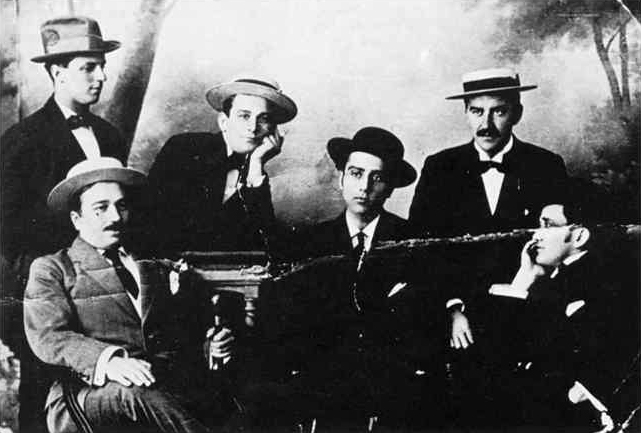|
1971–72 Yugoslav Cup
The 1971–72 Yugoslav Cup was the 25th season of the top football knockout competition in SFR Yugoslavia, the Yugoslav Cup ( sh, Kup Jugoslavije), also known as the "Marshal Tito Cup" (''Kup Maršala Tita''), since its establishment in 1946. Round of 16 In the following tables winning teams are marked in bold; teams from outside top level are marked in ''italic'' script. Quarter-finals Semi-finals Final See also *1971–72 Yugoslav First League * 1971–72 Yugoslav Second League External links1971–72 cup season detailsat Rec.Sport.Soccer Statistics Foundation1972 cup final detailsat Rec.Sport.Soccer Statistics Foundation {{DEFAULTSORT:1971-72 Yugoslav Cup Yugoslav Cup seasons Cup A cup is an open-top used to hold hot or cold liquids for pouring or drinking; while mainly used for drinking, it also can be used to store solids for pouring (e.g., sugar, flour, grains, salt). Cups may be made of glass, metal, china, c ... Yugo ... [...More Info...] [...Related Items...] OR: [Wikipedia] [Google] [Baidu] |
HNK Hajduk Split
Hrvatski nogometni klub Hajduk Split, commonly referred to as Hajduk Split () or simply Hajduk, is a Croatian professional football club based in Split, that competes in the Croatian First League, the top tier in Croatian football. Since 1979, the club's home ground has been the 34,198-seater Stadion Poljud. The team's traditional home colours are white shirts with blue shorts and blue socks. The idea to form a football club was started by group of Split students who were studying in Prague. After observing a game between Slavia and Sparta Prague, the group gathered at the U Fleků tavern and talked of creating a football club at home. When they returned to Split, they put their plan in motion and Hajduk was founded on 13 February 1911. Between the early 1920s and 1940, Hajduk regularly participated in the Kingdom of Yugoslavia national championship. Following World War II and the formation of the Yugoslav league system in 1946, Hajduk went on to spend the entire SFR Yugosla ... [...More Info...] [...Related Items...] OR: [Wikipedia] [Google] [Baidu] |
FK Radnički 1923
Fudbalski klub Radnički 1923 (), commonly known as Radnički Kragujevac (), is a professional football club from Kragujevac, Serbia and the major part of the Radnički Kragujevac Sports Society. The name Radnički means "Labourers'" in Serbian and its roots come from the relation the club had with labour movements during the first half of the 20th century. History Early years The club was formed in 1923, during an assembly in the Park restaurant in Kragujevac, under the name Mladi Radnik (). The first club president was Aleksandar Ratković. The first match played Mladi Radnik against local club SK Triglav and lost 2–0. The first visitor for a match against Mladi Radnik was SK Radnički from Belgrade. The match was played on 16 August 1925, and SK Radnički won 5–0. One week later, the club won its first match against Radnički Niš with 7–1. In 1929, Mladi Radnik changed its name to Radnički, an adjective invoking labour and workers in Serbian, as its roots come f ... [...More Info...] [...Related Items...] OR: [Wikipedia] [Google] [Baidu] |
Vilson Džoni
Vilson Džoni ( sq, Vilson Xhoni; born 24 September 1950) is a Croatian former professional footballer who played as a defender. He was named Yugoslav Footballer of the Year in 1978. Club career Džoni was born in Split to a family from Prizren, and is of Kosovo Albanian descent. He was a full back whose biggest weapon was his speed. At club level, he spent ten years at Hajduk Split playing a total of 207 league games. He then moved to Dinamo Zagreb, where he spent just one year before moving to Schalke 04. International career Džoni made his debut for Yugoslavia in a September 1974 friendly match against Italy and earned a total of four caps. His final international was a November 1978 Balkan Cup match against Greece. Post-playing career Džoni worked as a scout within Croatian First League's Hajduk Split Hrvatski nogometni klub Hajduk Split, commonly referred to as Hajduk Split () or simply Hajduk, is a Croatian professional football club based in Split, that compet ... [...More Info...] [...Related Items...] OR: [Wikipedia] [Google] [Baidu] |
Varaždin
) , image_photo = , image_skyline = , image_flag = Flag of Varaždin.svg , flag_size = , image_seal = , seal_size = , image_shield = Grb_Grada_Varaždina.svg , shield_size = , city_logo = , citylogo_size = , image_map = , mapsize = , map_caption = , image_map1 = , mapsize1 = , map_caption1 = , image_dot_map = , dot_mapsize = , dot_map_caption = , dot_x = , dot_y = , pushpin_map = Croatia , pushpin_label_position = , pushpin_map_caption = Location of Varaždin within Croatia , pushpin_mapsize = , subdivision_type = List of sovereign states, Country , subdivision_name = , subdivision_type1 = Countie ... [...More Info...] [...Related Items...] OR: [Wikipedia] [Google] [Baidu] |
Belgrade
Belgrade ( , ;, ; Names of European cities in different languages: B, names in other languages) is the Capital city, capital and List of cities in Serbia, largest city in Serbia. It is located at the confluence of the Sava and Danube rivers and the crossroads of the Pannonian Basin, Pannonian Plain and the Balkan Peninsula. Nearly 1,166,763 million people live within the administrative limits of the City of Belgrade. It is the third largest of all List of cities and towns on Danube river, cities on the Danube river. Belgrade is one of the List of oldest continuously inhabited cities, oldest continuously inhabited cities in Europe and the world. One of the most important prehistoric cultures of Europe, the Vinča culture, evolved within the Belgrade area in the 6th millennium BC. In antiquity, Thracians, Thraco-Dacians inhabited the region and, after 279 BC, Celts settled the city, naming it ''Singidunum, Singidūn''. It was Roman Serbia, conquered by the Romans under the reign ... [...More Info...] [...Related Items...] OR: [Wikipedia] [Google] [Baidu] |
Partizan Stadium The Par |



.jpg)
